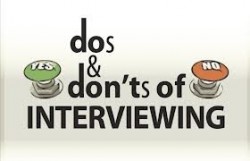Conducting effective interviews helps to ensure you are hiring the best-qualified candidate for the job. As a general rule, information requested and obtained through the interview process should be limited to that which is essential for determining whether an applicant is qualified for the job. The do’s and don’ts below can help you make the most of your interviews and stay in compliance with the law:
- DO create a comfortable environment. Whether you conduct the interview in an office or conference room, make sure the area is neat and quiet. Offering the candidate something to drink–water or coffee–is a small courtesy that demonstrates consideration and thoughtfulness.
- DON’T ask personal questions. Be especially careful of this at the beginning of the interview. A friendly demeanor may help put the candidate at ease, but engaging in too much small talk can inadvertently lead to questions bordering on areas that could be considered discriminatory (such as questions relating to the applicant’s marital status or political beliefs).
- DON’T ask discriminatory questions. Any questions regarding race, religion, age, ethnic group, national origin or ancestry, political affiliations, military service, disability or other sensitive topics may be discriminatory and should be avoided. Also be careful not to ask any questions that could elicit such information (for example, questioning an applicant about the origin of an unusual surname). If an applicant volunteers irrelevant or inappropriate information during an interview, disregard the information and do not write it down.
- DO keep the conversation focused on job-related information. In reviewing your interview questions, ask yourself if the information you are seeking is really needed to evaluate the candidate’s qualifications, skills, and ability to meet the challenges of the job. Ask only for information you intend to use in making a hiring decision and know how you will use the information to make that decision. Avoid asking questions that are not relevant to the performance of the essential functions and responsibilities of the position.
- DO provide the candidate with information regarding next steps. Be sure to give the candidate an opportunity to ask any final questions and provide a general timeframe for getting back in touch regarding any next steps and decisions. Thank the candidate for his or her interest in the job and your company.

